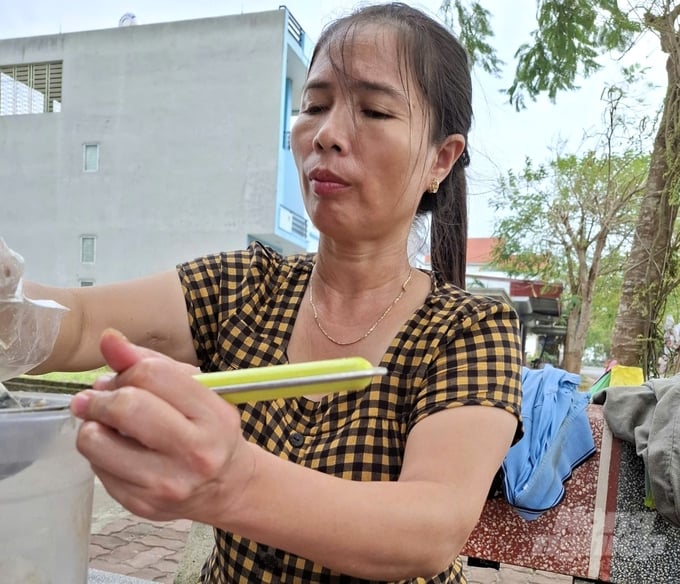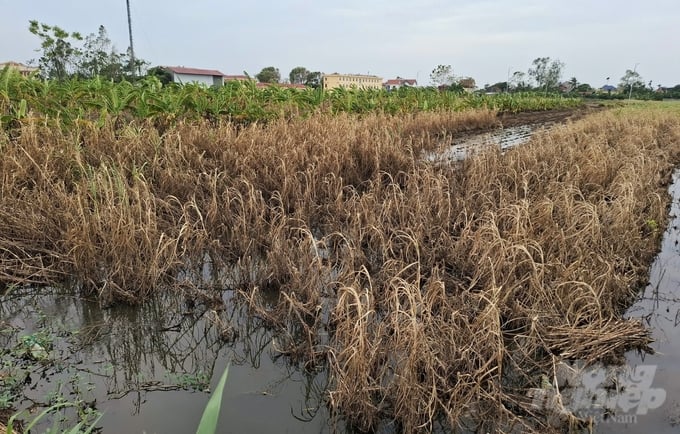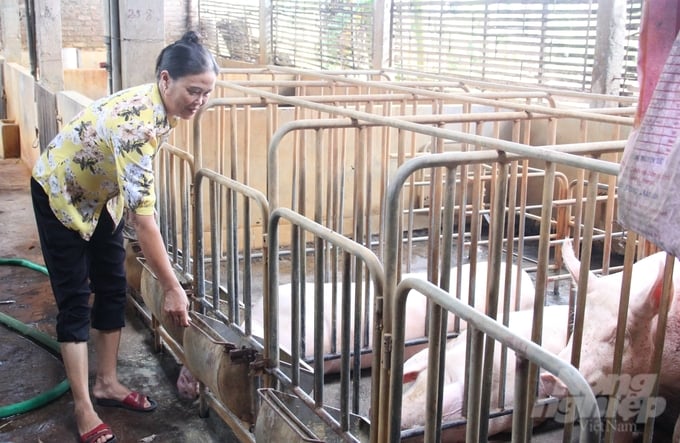June 19, 2025 | 03:18 GMT +7
June 19, 2025 | 03:18 GMT +7
Hotline: 0913.378.918
June 19, 2025 | 03:18 GMT +7
Hotline: 0913.378.918

According to Dao Van Nhanh, livestock farmers are quite worried about the risk of a lack of green feed because many grass areas are flooded and dead. Photo: Trung Quan.
The land was overfilled with water because of Typhoon No. 3. The time rains and floods receded was also the time livestock and poultry farmers in Hung Yen province breathed a sigh of relief. They rushed back to clean up mud and disinfect barns, quickly bringing production activities back to normal.
Ha Thi Dao, Ke Chau 3 village, Phu Cuong commune (Kim Dong) recalled the strong winds and heavy rains blowing off part of the roof of her family's pig farm. Realizing the unfavorable situation, Dao's family mobilized manpower and hired more people and vehicles to quickly move over 200 pigs to a temporary house and avoid the risk of being submerged by water. The pig farm was continuously flooded for three days, and during those three days, the whole family barely had any sleep.
The weather cleared up and the water slowly receded. Her family immediately returned to the barn to clean up and bring the pigs back. The roof was quickly repaired above, while the mud and dirt were cleared below, and then disinfectants were sprayed.
The herd of 200 pigs was lucky to escape, but they had submerged in water for a long time. Being used to living in cages, when suddenly changing their living place and diet, many of the pigs got diarrhea and respiratory infections. Dao’s family was struggling to take care of them so as not to affect their growth and development.
There was one more dangerous problem. Before the storm, the pig farm, once strictly controlled to prevent dangerous diseases specifically African swine fever, has now been opened wide. Ha Thi Dao still held the fear of losing the entire herd of pigs.

According to Ha Thi Dao, when the environment is polluted, the risk of dangerous outbreaks of diseases in pigs is very high. Photo: Trung Quan.
Risk of green feed shortage for livestock
When the water receded, Dao Van Nhanh (Tan My 1 village, Phu Cuong commune) had to mobilize all the manpower to clean continuously for 3 days while spraying disinfectant many times around the barn and surrounding area to basically restore the farm to its original state.
Unfortunately, 10 pigs that had just been weaned from their mothers, when locked up in the yard, caught colds and had diarrhea then died. The rest of the herd also started showing signs of illness. The cows that had been kept in captivity were panicked when brought to a strange place. They stopped eating and quickly lost weight.

Many areas of grass grown for livestock farming in Hung Yen were completely wiped out. Photo: Trung Quan.
The situation has somewhat stabilized, but new worries have arisen. The entire 6 sao of grass (Vietnamese measurement, 1 sao equals 360 m2) used as green fodder for Dao Van Nhanh’s cows were flooded and died, while the cows consume about 400 - 500 kg of fresh grass every day. The family has no choice but to use the reserved amount of dry straw to feed the cows and reduce the pressure on green fodder. However, with a daily intake of 4 - 5 rolls of straw (each roll costs VND 40,000), maintaining this for a long time would pose a very difficult problem.
According to Hoang Van An, Deputy Director of the Hung Yen Sub-Department of Livestock Production, floods and rains have polluted the livestock environment, resulting in a reduction in the growth, development and resistance of livestock. This situation also creates conditions for pathogens to arise and spread.
In order to quickly restore production and proactively control diseases for livestock and treat the environment after Typhoon Yagi, the provincial Sub-Department of Livestock Production along with localities are urgently executing the general cleaning, disinfection and environmental decontamination, Phase II, 2024 (from September 10 to October 10), implementing vaccination for livestock and poultry in the autumn-winter crop to ensure population immunity.

Hung Yen Sub-Department of Livestock Production recommends that people should not rush to restock their herds without ensuring environmental and disease safety. Photo: Trung Quan.
The Sub-Department has provided and distributed more than 27,000 doses of hemorrhagic septicemia vaccine for cattle and buffalo, more than 241,000 doses of African swine fever vaccine, more than 241,000 doses of swine erysipelas vaccine for localities to carry out vaccination.
By September 23, localities had deployed vaccination of more than 7,000 doses of hemorrhagic septicemia vaccine for cattle and buffalo; more than 61,000 doses of African swine fever vaccine, and more than 61,000 doses of swine erysipelas vaccine.
Translated by Samuel Pham

(VAN) To address plastic pollution, closing the plastic recycling cycle will bring significant economic and environmental benefits.

(VAN) According to the Binh Thuan Department of Industry and Trade, in the first five months of 2025, Binh Thuan's dragon fruit export turnover increased by 20.65% compared to the same period last year.

(VAN) EU countries on Thursday gave final approval to new tariffs on fertilizer imports from Russia, a move aimed at cutting off revenue that could support Moscow’s war in Ukraine, despite concerns from European farmers.

(VAN) The working delegation from the Ministry of Agriculture and Environment conducted an important trip to the Netherlands to strengthen strategic partnerships and sustainable development in the agricultural sector.

(VAN) The letter ‘A Plea from the Ocean’ not only evokes emotion but also awakens the human conscience to the responsibility of protecting life on Earth.

(VAN) The Department of Agriculture in South Africa has announced the country’s first mass vaccination of poultry to prevent local birds from contracting avian influenza.

(VAN) Establishment of the Mekong Delta Regional Agricultural Linkage Center, aiming for a closed value chain, deep processing, trading platforms, and international market connectivity.